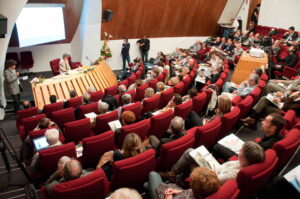Soutenance de thèse :
Molecular Insights into L. monocytogenes Persistence via Label-Free Quantitative Proteomics
Listeria monocytogenes (Lm) is a facultative intracellular pathogen responsible for listeriosis, a severe foodborne illness in pregnant women and immunocompromised individuals. Known for its adaptability, Lm persists across varied environments, making it difficult to control. During long-term infection in epithelial cells, such as hepatocytes and trophoblasts, Lm shifts from a replicative to a quiescent state within lysosome-like vacuoles, termed Listeria-containing vacuoles (LisCVs). This transition is associated with the loss of the actin-nucleating protein ActA and the arrest of actin polymerisation at the bacterial surface. Within LisCVs, the majority of bacteria remain intact and enter a slow/non-replicative or a viable but non-culturable (VBNC) state, a dormant form enabling persistence under adverse conditions. Prolonged infection of hepatocytes by Listeria disrupts host immunity, particularly reducing the secretion of acute-phase proteins (APPs), key to the immune response. This process might prevent the complete elimination of Listeria from the liver, thereby favoring the establishment of persistent infection. Lm also displays notable adaptability outside host environments, particularly in water systems, where it can enter a VBNC dormant state. VBNC pathogens pose heightened health risks as they are undetectable by growth-based methods and can reactivate into a virulent form. A recent study shows that when exposed to these nutrient-poor conditions, the bacteria lose their rod shape and become round due to their cell wall loss. These cell wall-deficient (CWD) forms can adapt to physicochemical imbalances by modifying their membrane and producing specific proteins. The first part of this thesis explores host-pathogen interactions during Lm infections, focusing on trophoblast cells. Using comparative proteomics via LC-MS/MS, this study analyses differences in secretome profiles between infected and uninfected cells across replicative (24h p.i.) and persistent (96h p.i.) infection phases. Pathway analysis in the trophoblast model indicates that Lm modulates immune responses through intermediary processes like angiogenesis and signalling pathways, including HIF-1α and MAPK, essential for signal transduction. Similar to the liver, these modulations may be crucial for creating and sustaining a niche in trophoblast cells; however, mechanisms remain to be identified. The second part of this thesis investigates Lm environmental persistence using an in vitro mineral water model and comparative proteomics. Proteomic data identified the downregulation of cell wall-related proteins, consistent with the establishment of CWD form. Functional analysis showed additional stress responses, including decreased signal transduction, virulence, and energy production, all consistent with the VBNC state. These findings provide insight into Lm environmental survival strategies, aiding in the understanding of its persistence mechanisms. This work examines Lm persistence in trophoblast cells and environmental conditions, demonstrating its molecular adaptation to survive in diverse environments. Within host cells, Lm emphasises immune repression, while in nutrient-poor conditions, it focuses on nutrient scavenging and stress resistance. These findings highlight its resilience and could lead to potential applications for detection and treatment of persistent infections.
Jury members:
- Olivier DUSSURGET (Professeur, Université Paris Cité, Institut Pasteur, Paris) – Rapporteur
- Natalie ROLHION (Chargée de Recherche, Sorbonne Universite, INSERM, Paris) – Rapporteur
- Luc CAMOIN (Ingénieur de Recherche, CRCM, AMU, INSERM Marseille) – Examinateur
- Florence DUBOIS-BRISSONNET (Professeur des Universites, AgrosParisTech, MICALIS, Jouy-en-Josas) – Examinatrice
- Hélène BARRETEAU (Maître de Conférences, Université Paris-Saclay, Paris) – Membre invité
Directed by:
Alessandro Pagliuso (CR) and Céline Henry (IR).




